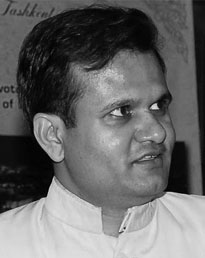One Globe Forum 2020
- New dates
coming soon! - Register
Prof. Siddharth Shanker Saxena

Chairperson - Cambridge Central Asia Forum, Director - Cambridge Centre
Siddharth Shanker Saxena (Montu) is Chairperson of the Cambridge Central Asia Forum, and Honorary Secretary of the Committee for Central and Inner Asia. He trained as an anthropologist, historian and a physicist. He focuses on Innovation and Technology Transfer, knowledge systems, social and political development and institutional history in Central and Asia and the Middle East. He is a Fellow of Jesus College and Research staff member of the Cavendish Laboratory at University of Cambridge.
He was born in Lucknow, India, in 1971, but his education took him to Britain, France, Germany, the Soviet Union and Switzerland. From Lucknow, he went on to New Orleans to complete High School and proceeded to the University New Orleans, where he studied physics and history of Islam. He continued on to a doctorate in Historical Anthropology of Islam in Khorassan. From the United States he came to Trinity College, Cambridge, UK on a Commonwealth Trust-Trinity Scholarship to study for a Ph.D. at the Cavendish Laboratory. He then did Post-Doctoral research at University of Groningen, The Netherlands and University College London followed by election to a Research Fellowship at Girton College, Cambridge. He also Directed of Centre for Materials and Microsystems in Trento, Italy and is General Director of Centre of High Technologies in Tashkent, Uzbekistan.
He has been involved in field based research in Central Asia since the early nineties with particular focus on Bukhara in Uzbekistan and the Ferghana Valley (which is shared by the Uzbeks, Kyrgyz and the Tajiks). Since 2002 he has also been working in Afghanistan, Almaty and Astana in Kazakhstan and Kashgar in China. In the past he has also spent extended periods in Iran and Egypt for field work. He has also worked on Russia, Pakistan, Ukraine, GCC Countries and Azerbaijan and The Caucuses.
Current key projects he is focusing on include a study of notions of eastern cosmopolitanism in Bukhara and development of the concept of ‘projected commonality’ along with an ethnographic study of Challa, the ‘Muslim Jews’, of Central Asia. He also directs the Cambridge project on documenting inter-linkages between environment, culture and education through mapping of local knowledge systems in Ferghana Valley. This historical and anthropological research is done in conjunction with policy related projects like understanding of social development in the Shanghai Cooperation Organisation realm, dialogue between the Muslim world and the West and Environmental Security of the Central Asian Region. This is in parallel with his work on superconductors, magnets, graphite and renewable energy applications related to rare-earth metals and oxides.
He has supervised fourteen PhD dissertations, fifteen Masters Projects and a number of undergraduate dissertations. In the last five years he has delivered more than 70 plenary and keynote addresses and international conferences and government and public forums. He has published 60 peer reviewed and invited research articles and book chapters in both Islamic and Central Asian Studies as well as Experimental Physics ( Several in the journal Nature). He has chaired 10 major international conferences and numerous panels.
Siddharth Saxena is consulted frequently by several international organisations in the UN system and otherwise and is on Cambridge Middle East working group, Cambridge India Partnership Group, Cambridge International Development Forum, Mongolia and Inner Asia Studies Unit Management Committee, UK India Business Forum next Generation Advisory Board, British Uzbek and Kazakh Society Boards. He guides a number of institutional development projects in Central Asia.
He has discovered four new superconductors, including the first ferromagnetic superconductor. He was awarded the International Union of Pure and Applied Physics (IUPAP) Young Scientist Medal in 2006 and a Medal for Service to Education in Kazakhstan, th Kazakh minister of education in April 2009 and an Honorary Doctorate and Professorship in November 2009. Honorary Professor of Astana Economic Forum 2012. Presidential Medals of Honour from booth Uzbekistan and Kazakhstan in 2011. He is a Director of Future Power Ltd., CamCool Ltd., CantabrigiaAdvisors Ltd.
In 2011 he, together, with Lord Waverly took to review and renew the Foreign Affairs Select Committee Report on Central Asia and South Caucuses.
 Register for One Globe 2020
Register for One Globe 2020
SPONSOR
Showcase innovative products & services for the knowledge economy
Connect with decision makers and influencers and showcase your brand to a highly-targeted international audience. Contact our sales team for sponsorship opportunities that meet your specific requirements.
More details >>SPEAKER
Steer thought-leadership, voice opinions
Got an outstanding case study or a differentiated perspective on building a 21st century knowledge economy? Or incisive views, suggestions and proof points that can shape the future and inspire and impact millions? Send in your speaker recommendations.
More details >>DELEGATE
Learn, network, and discuss
Be part of an audience of leaders and stakeholders from across 20 countries to discuss, debate and deliberate issues at the intersection of economic development and growth through the lens of innovation, technology, education, skills, urbanization and policy on how to build a 21st century knowledge economy in India and South Asia. Book your seat today.
More details >>




